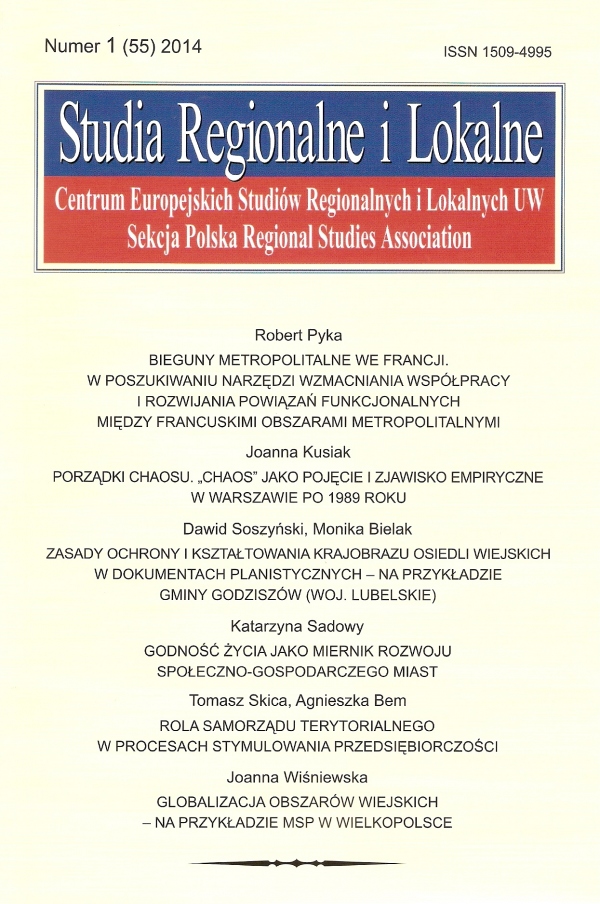Issue:
1(55)/2014
Robert Pyka
Metropolitan Poles in France. In search of tools to enhance cooperation and develop functional relationships between French metropolitan regions
DOI: 10.7366/1509499515501
Bieguny metropolitalne we Francji. W poszukiwaniu narzędzi wzmacniania współpracy i rozwijania powiązań funkcjonalnych między francuskimi obszarami metropolitalnymi
Francuska reforma terytorialna z grudnia 2010 r. miała – wedle zapowiedzi – gwałtownie zmienić strukturę francuskiego lokalnego systemu polityczno-administracyjnego poprzez przyjęcie rozwiązań instytucjonalnych pozwalających na silne upodmiotowienie największych aglomeracji oraz uwzględnienie postępujących procesów metropolizacji. Zapowiadane zmiany miały dostosować model organizacji terytorialnej do wymogów współczesnej gospodarki, dynamizując wzrost gospodarczy kraju ogarniętego stagnacją. Ustanowienie usankcjonowanych ustawowo metropolii, jako nowych jednostek samorządu terytorialnego przejmujących najważniejsze kompetencje gmin i departamentów, miało być „terytorialną rewolucją”, która ostatecznie zakończyła się jednak niepowodzeniem. Tymczasem „dopisane” do projektu ustawy w ostatnim momencie regulacje przewidujące możliwość tworzenia stosunkowo luźnych form współpracy międzyterytorialnej w postaci „biegunów metropolitalnych” odegrały rolę, której ustawodawca zapewne się nie spodziewał. Sytuacja ta pokazuje rosnące znaczenie elastycznych pod względem kompetencyjnym oraz terytorialnym rozwiązań, wykorzystujących wielopłaszczyznowe współrządzenie (multi-level governance), jako efektywnego narzędzia zarządzania międzyterytorialnego w sytuacji inercji klasycznej struktury terytorialnej i blokady jej reform.
Metropolitan Poles in France. In search of tools to enhance cooperation and develop functional relationships between French metropolitan regions
The aim of the French territorial reform from December 2010 was to change the structure of the French local political and administrative system thanks to institutional solutions that would strengthen the biggest agglomerations and lead to their progressive metropolization. The announced changes were meant to adjust the model of territorial organization to the requirements of contemporary economy and to enhance national economic growth of the country in stagnation. The introduction in the law of metropolises as new local-government territorial units that took over the most important competences of municipalities and departments was meant as a “territorial revolution”. Unfortunately, it failed. Meanwhile, the regulations that would make it possible to create a rather loose form of interterritorial cooperation, a so-called Metropolitan Pole, that were inserted into the project at the last moment, gave results unexpected by the legislator. This situation shows the growing importance of flexible solutions regarding competences and territory, solutions that use multilevel governance as an effective tool for inter-territorial management in the situation of inertia of the classical territorial structure and obstacles to its reform.
Affiliation:
Robert Pyka: Instytut Socjologii, Uniwersytet Śląski, ul. Bankowa 12, 40-007 Katowice;
robert.pyka@us.edu.pl 


